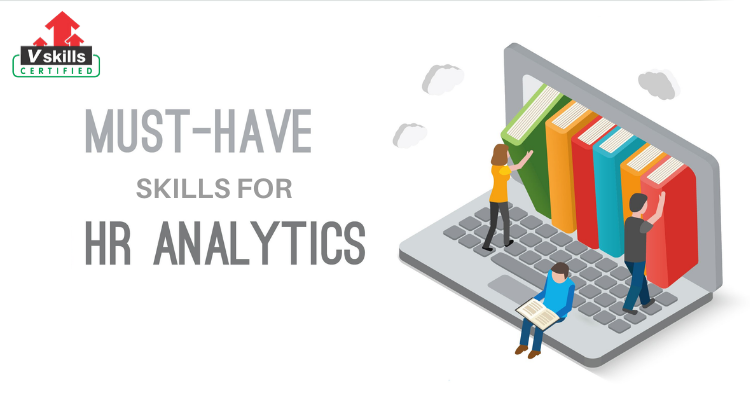Do you have an interest in the field of human resources and want to learn more about its analytical aspects? If so, then getting into HR Analytics would be a great career choice for you. Apparently, HR is gradually moving away from making gut decisions to more evidence-based decision making.
Earlier, it was assumed that as a team the contribution of HR is limited to extending offer letters and onboarding new hires, but human resource analytics (HR analytics) proved them wrong. When used strategically, analytics can transform how HR operates, giving the team insights and allowing it to actively and meaningfully contribute to the organization’s bottom line.
As a result, companies are investing huge amounts of money into special staff including HR analysts. But the ruling question here is how do I get into HR analytics, accompanying by why should I take a leap into HR Analytics? So, in order to understand the essence of HR analytics, we will be explaining what an HR Analyst is, their job roles and how to become one.
What is HR Analytics?
Human Resource Analytics (HR Analytics) is described as the area in the field of analytics that deals with people analysis. HR Analytics in an organization applies analytical processes to the human capital within the organization to improve employee performance and employee retention.
Further, HR analytics mainly focuses to provide better insight into each of the human resource processes, gathering related data and later on using this data to make informed decisions on how to improve these processes.
HR Analyst Skills in Demand
HR Analytics need different skills to do their work well. For your convenience, we have analyzed dozens of HR Analytics vacancies and have listed out general as well as technical attributes that hold supreme importance for anyone who wishes to build a career in HR Analytics.

General Attributes
- Analytical mindset – First things first, you should be naturally analytical in order to manipulate and translate a large volume of data into meaningful solutions.
- Systems analysis – After that, you need to be able to quickly understand how databases, systems, and processes work. Moreover, you should always seek to improve efficiencies as well as making the most of the information available.
- Attention to detail – Lastly, being an analyst, it is extremely essential that you not only assess high-level trends but also identify the smaller issues which can potentially make a large commercial impact on the business.
Technical Attributes
- MI & Data management – Firstly, you must possess strong operational capabilities across the Microsoft office suite and machine learning application. Database experience incorporates Excel, Access, and Visio. Moreover, SQL experience can also be one of the requirements where a high volume of data manipulation and analysis is involved.
- Systems Management – After that, you need to have a thorough understanding of system management. In other words, you need to have an understanding of how to navigate and maximize the use of HR systems.
- Qualifications – Lastly, employers will want to know that you have strong technical capabilities to match your commercial mindset. Therefore, in order to slide into HR Analytics, it is crucial to hold a degree associated with HR, Business or Analysis.
Roadmap to become an HR Analyst
We shall now be discussing the basic requirement and qualification to take a step forward to become an HR Analyst. As has been well said,
Human resource program no longer need to be based on SOFT reasoning but should be as analytical as data-driven as any other management discipline
Education Requirement
- Firstly, a bachelor’s degree or master’s degree in business administration.
- Also, you should have a good understanding of business, management, economics, political science and government, accounting, finance, marketing, psychology, computer and information science, and English.
Work Experience
- Many analysts enter the occupation with several years of work experience in various organizations.
- Standard work backgrounds involve experience in management, human resources, and information technology.
Prerequisites to become an HR Analyst
Clearly, there is no set way to become an HR analyst. Candidates from psychology, business administration, and HRM will help you through to become a good HR Analyst. Also, experience in data analysis in MS Excel is a Big Plus!
Advancement
- After moving to the senior level, consultants may supervise teams working on more complex projects and become more involved in seeking out new business.
- These senior consultants often move to senior management positions at non-consulting organizations after leaving their old workplace.
Reasons to take a leap into HR Analytics
HR analytics can work wonders for an organization when you do it right manner and in the right direction. In addition, it arms you with an authoritative job profile and helps you scale up in your career as well.
Let’s give a look at some of the benefits of HR Analytics.
Improve your hiring process
Talent acquisition is a pivotal element of the HR process. Generally, organizations find it difficult to find the right candidate, keep track of how many candidates actually join and how many drop-offs at what stage? However, all these are just some questions that one can encounter and resolve through analytics. Thus, the presence of an HR Analyst improves the hiring process of the organization.
Reduce attrition
Secondly, employee retention is becoming harder day by day, especially with the younger workforce not afraid of switching jobs frequently. Here, HR Analytics plays a crucial role by conducting exit interviews, gathering data, looking at the reasons, patterns and finding a way to arrest the attrition rate.
Improve employee experience
It is important for managers and HR representatives to meet with employees regularly to understand what are the factors affecting employee experiences in positive and negative ways. This is a crucial step in improving employee experience which many organizations fail to realize.
Improve your talent processes
Talent processes are not limited to pre-hiring, hiring or annual performance reviews, but they are much more than that. Each organization is unique and has its own process, however, there are some processes that should remain standard. These can be regular one-on-ones, skip-level meetings, etc. HR should always monitor their talent processes, identify challenges and bottlenecks if any, and then work on them. Further, conducting employee surveys is a good idea to let employers know they are being heard.
Careers opportunities in HR Analytics
You must be curious to know about various options in the field of HR Analytics. Therefore, to crush your curiosity, below are some of the most in-demand specialist human resources jobs along with different functions and paths.
Talent analytics: Firstly, talent analytics is more of a qualitative in nature and is basically for processes from talent management like personnel development, recruitment, etc. It helps organizations to better analyze turnover, identifying top performers, identifying gaps and developing the proper training for them. Further, talent analytics identifies reasons for attrition and provides options to make strategic decisions for retention as well.
Manpower analytics: Subsequently, this is another common domain that is more quantitative in nature. It is the base for leaders to develop recruiting methods and make specific hiring decisions, optimizing organization structure, identifying quantifying factors for job satisfaction; determining the need for new departments and positions.
Further, it’s responsibilities include identifying, motivating and preparing its future leaders, align and motivate the workforce and continuously improve the way of work.
Predictive Analytics: Last but surely not least, this particular career option is becoming very attractive nowadays. It is basically based on statistics and data that helps leaders to make more strategic decisions based on facts. Data are generally displayed with graphics, statistical reports, and dashboards which are easy for leaders to understand.
Top HR Analytics Certification bodies
There are various certification providers for HR Analytics. Some of the top certifications include–
Vskills – India’s Largest Certification Body
Vskills is India’s largest Assessment Body which works on the principle to improve the scope for professional certification and academic testing mechanism. Moreover, Vskills Certification helps enrich your profile –
- Improving relevance and applicability
- Helps to build confidence and self-accomplishment
- Improves marketability
- Hike in salary
- Further improved academic recognition
AHLC
Aon Hewitt Learning Center is a certification body which envisages real learning to help HR impact business outcomes.
Nulearn
Nulearn is an innovative educational platform that curates upskilling and training solutions in the light of emerging Industrial.
Udemy
Udemy is an online learning and teaching marketplace. Moreover, it turns your current online courses into certification courses.
Profile Placement
After scrolling through all the details, you might be keen to know the profile placement which involves the name of the company and the average salary of the company. There are many top-level companies ruling over the market space for a long time. Some of the top financial institutions hiring HR Analytics include –
- Apple
- Alaska
- Pepsico
- Synerzie
- Wipro
- Accenture
- Paytm
HR Analytics Job Roles
Once you understand the companies that might hire you after your HR Analytics certification, you must be keen to know the job roles you might perform. There are a lot of HR Analytics job roles available in the marketplace. However, the most important job for you is to understand the best fit for yourself. Some of the job roles which falls under the category of HR Analyst include the following –
- Chief Manager- Human Resources
- HR Reporting & Analytics
- Data Operations Analyst
- Business Operations Analyst
- HR Business Intelligence Analyst
Average Salary of an HR Analyst
In general, the salary depends on the skills and past experience of a candidate. Salaries for the HR analyst role can vary wildly depending on the size of the company, the location, and the experience of the analyst. The below graph displays the average salary of a working professional.
The following gives a general overview of the companies that hire together with their average base salaries.


This salary is a pure indication of the increase in importance and prevalence of the analyst’s jobs which were almost non-existent 15 years ago.
Expert’s Corner
In conclusion, Human Resource is a treasure chest of employee data. If you have noticed, the role of an HR Analyst is challenging in a sweet way and there is never a dull moment in the career of an HR. Being an HR Analyst, you not only make space for new things but also experience amazing career growth.
We can say that HR analytics enables HR professionals to make data-driven decisions to attract, manage, and retain employees, which in return improves ROI. Also, it helps leaders to make decisions to create better work environments and maximize employee productivity. Moreover, it has a major impact on the bottom-line when used effectively.
Enrich your profile with advanced learning skills and expert tutorials on HR Analytics. Prepare and become Certified HR Analytics Professional Now!
 Stay Ahead with the Power of Upskilling - Invest in Yourself!
Stay Ahead with the Power of Upskilling - Invest in Yourself! 



